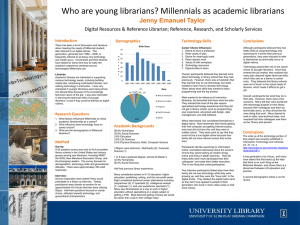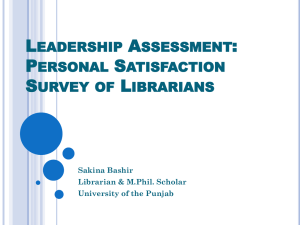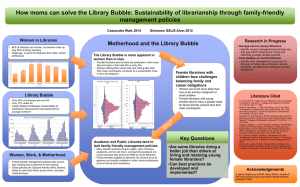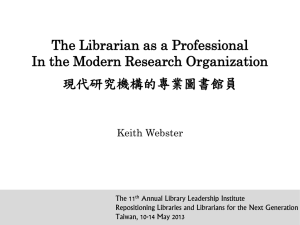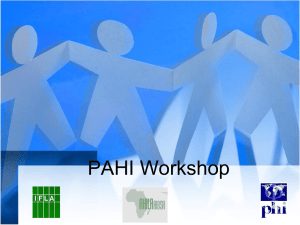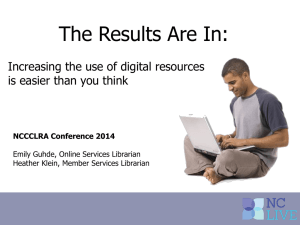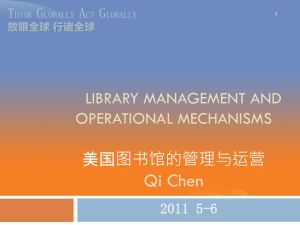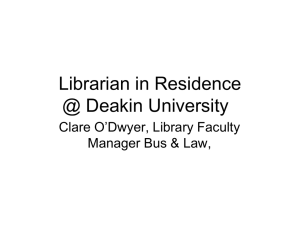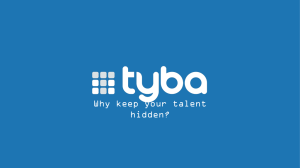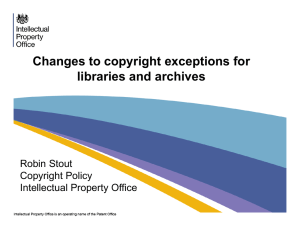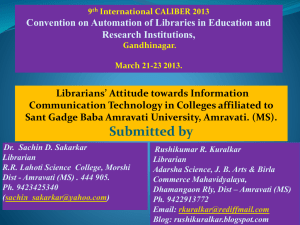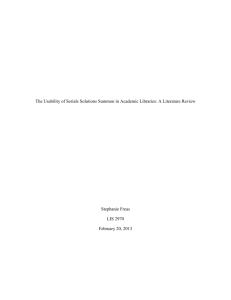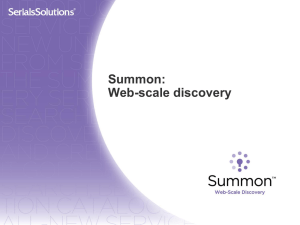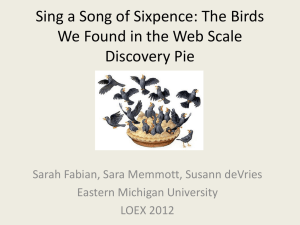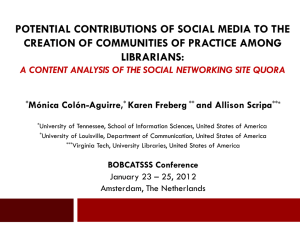Uncovering Discovery
advertisement
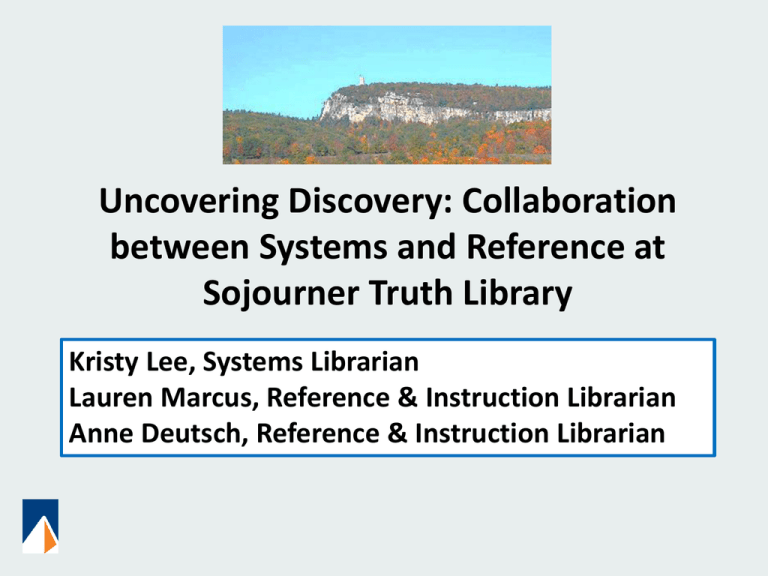
Uncovering Discovery: Collaboration between Systems and Reference at Sojourner Truth Library Kristy Lee, Systems Librarian Lauren Marcus, Reference & Instruction Librarian Anne Deutsch, Reference & Instruction Librarian Timeline of New Paltz Discovery Sojourner Truth Library Website http://library.newpaltz.edu/ Implementation • Completed Catalog Questionnaire from EBSCO • Implementation team: systems, electronic resources & serials librarians • Inputs from reference/instruction librarians • Created the ‘EDS Search Testing’ spreadsheet • Librarians compiled a priority list ‘Out-of-the-Box’ Version Major Problems • Massive search results • Content we don’t subscribe to • Not showing our catalog collection/holdings Minor Issues • Search terms disappear in results list • Search results include duplicates • Print journal holding update More issues reported in the ‘EDS Search Testing’ Spreadsheet Evaluation and Assessment of Discovery Tools: What do we need to do and what do we want to know? • Establish an evaluation and beta testing committee • Establish a training plan and schedule for students, staff and faculty • Conduct usability studies and get feedback from students and teaching faculty before implementation and launch of service • Determine what level of customization is available or even feasible • Determine whether relevancy ranking can be modified to prioritize access to local holdings • Determine the purpose and placement of discovery in the campus community, i.e. who will be using these tools When I search for Goldman Sachs I get irrelevant results from Fresh Brewed Media and Marquis Biographical Dictionary The open URL resolver is not showing up for content not available as full-text. What resources reside in the Integrated Search Universe? • Collection access Books are not listed Refined/faceted in the•“Source Type” list. . .? search capabilities • Relevancy EDS rankings seems to save How do I access the Wall Street Journal print holding? my search settings without displaying those settings—it is hard to refine a search if I can’t view the limiters. When I finally select “Books” in the expanded source list, I find books that are not in our collection. Your Logo Here For all the information you need click here. . . A library website should “provide an understanding of the content, services, and tools that the site provides. This is a different task than that of Google” Swanson, Troy A. and Jeremy Green. “Why We Are Not Google: Lessons from a Library Web site Usability Study.” The Journal of Academic Librarianship, 37.3 (2011): 222-229. Integrating Discovery Tools into the Sojourner Truth Library homepage What is your experience? Considerations for Instruction Program • Assess and debug WSDS thoroughly before incorporating it into instruction program. • Analyze findings from assessment activities to determine how tool is used and where users need the most support. • Create learning objects to support those needs and make them as accessible as possible. • Place WSDS in your instructional toolkit and incorporate it in classes where its strengths map to course content or assignment. • Help students develop the ability to determine the right tool for their specific needs. Resources for Assessment and Implementation of WSDS in ILI Hopes, Impression, and Reality: Is a Discovery Layer the Answer? Susan Avery & Lisa Janicke Hinchliffe Fostering Discovery: Collaborative Solutions for Teaching with Discovery Tools Dunstan McNutt & Mary Moser Kristy Lee: leek@newpaltz.edu Lauren Marcus: marcusl@newpaltz.edu Anne Deutsch: deutscha@newpaltz.edu Annotated Bibliography Asher, Andrew, et al. “Paths of Discovery: Comparing the Search Effectiveness of EBSCO Discovery Service, Summon, Google Scholar, and Conventional Library Resources.” College & Research Libraries 74.5 (2013): 464-488. Directory of Open Access Journals. Web. 20 Apr. 2014. In this analysis of a 2011 study at Bucknell and Illinois Wesleyan Universities, researchers compare search efficacy of EDS, Summon, Google Scholar, and traditional library catalogs and databases. They conclude that most students are unable to evaluate sources and rely on default search settings and relevancy rankings. Buck, Stefanie, and Christina Steffy. "Promising Practices in Instruction of Discovery Tools." Communications in Information Literacy 7.1 (2013): 66-80. Library, Information Science & Technology Abstracts with Full Text. Web. 2 Apr. 2014. Using a literature review, a survey for instruction librarians, and interviews, researchers develop a list of best practices for integrating discovery tools into library instruction programs. Buck, Stefanie, and Margaret Mellinger. "The Impact of Serial Solutions’ Summon™ On Information Literacy Instruction: Librarian Perceptions." Internet Reference Services Quarterly 16.4 (2011): 159-181. Library, Information Science & Technology Abstracts with Full Text. Web. 2 Apr. 2014. This study reveals ambivalence by academic librarians to integrate Summon discovery tools into library instruction. Cassidy, Erin Doris, et al. “Student Searching with EBSCO Discovery: A Usability Study.” Journal of Electronic Resources Librarianship 26.1 (2014): 17-35. Web. 2 Apr. 2014. Findings of this 2012 usability study indicate that students rarely go past first page search results and do not understand source type terminology. For this reason, the Google-type interface of web-scale discovery tools often overwhelm and confuse less experienced student researchers. Kaufman, Karen, Jeanne Larsen, and Patricia DeSalvo. “Discovering the Discovery Tool: The Introduction and Impact on Research and Instruction at Seminole State College of Florida.” College & Undergraduate Libraries 19.2-4 (2012): 278-296. Library, Information Science & Technology Abstracts with Full Text. Web. 2 Apr. 2014. This case study presents the benefits and challenges of integrating discovery tools into library research and instructional support. The online faculty questionnaire/assessment, included in the appendix, would be helpful in the evaluation of newly implemented discovery tools. Kornblau, Amy I., Jane Strudwick, and William Miller. "How Web-Scale Discovery Changes The Conversation: The Questions Librarians Should Ask Themselves." College & Undergraduate Libraries 19.2-4 (2012): 144-162. Library, Information Science & Technology Abstracts with Full Text. Web. 2 Apr. 2014. This article provides advice on integration of library services and resources after discovery implementation. Kulp, Christina, Cheryl McCain, and Laurie Scrivener. "Teaching Outside the Box: ARL Librarians’ Integration of the “One-Box” into Student Instruction." College & Research Libraries 75.3 (2014): pre-print. Web. 4 Apr. 2014. The results of this study indicate that most participating ARL libraries and librarians prefer to teach beyond the constraints of “one-box” search tools. Parry, Marc. “As Researchers Turn to Google, Libraries Navigate the Messy World of Discovery Tools.” The Chronicle of Higher Education 60.32 (2014). Academic OneFile. Web. 22 Apr. 2014. Concerns over less than transparent relevancy rankings and built-in bias of competing discovery vendors are articulated in this brief article. Rose-Wiles, Lisa M., and Melissa A. Hofmann. “Still Desperately Seeking Citations: Undergraduate Research in the Age of Web-Scale Discovery.” Journal of Library Administration 52.2-3 (2013): 147-166. Findings and experiences from Seton Hall University and Rider University libraries indicate concerns over confusing search terms, student inabilities to distinguish between source types, and mediocre search results. Swanson, Troy A. and Jeremy Green. “Why We Are Not Google: Lessons from a Library Web site Usability Study.” The Journal of Academic Librarianship, 37.3 (2011): 222-229. Web. 4 June 2014. This article evaluates a 2009 web site usability study conducted at Moraine Valley Community College. Authors Swanson and Green determine that the library’s traditional, multi-tiered gateway page was a more effective access point than a central-search, one-box homepage.
